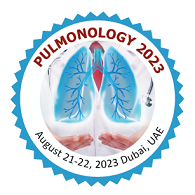Abderrahmane Errami
Faculty of Medicine and Pharmacy of Casablanca,Morrocco
Title: Mendelian susceptibility to mycobacterial diseases: Up-to-date
Biography
Biography: Abderrahmane Errami
Abstract
Tuberculosis, caused by Mycobacterium tuberculosis (M.tb), has caused more than a billion deaths over the last 200 years, more than malaria, smallpox, influenza, AIDS, cholera, and plague combined. There was a remarkable interindividual variability in the outcome of exposure to M.tb and the course of infections. Although genome-wide association studies have identified loci associated with host predisposition or resistance to tuberculosis, their results were not consistent or reproducible. The first molecular evidence of a monogenic predisposition to mycobacteria came from the study of Mendelian susceptibility to mycobacterial disease (MSMD), which confers a selective susceptibility to weakly virulent mycobacteria, such as BCG vaccine and various environmental mycobacteria, in otherwise healthy individuals. Patients are also vulnerable to M.tb and about half of them develop non-typhoidal salmonellosis. In specific genetic disorders, patients also suffer from chronic mucocutaneous candidiasis (CMC), viral and/or, more rarely, parasitic infections. To date, 35 genetic disorders caused by mutation of 19 genes (IFNGR1, IFNGR2, IFNG, IL12RB1, IL12RB2, IL23R, IL12B, ISG15, USP18, ZNFX1, TBX21, STAT1, TYK2, IRF8, CYBB, JAK1, RORC, NEMO and SPPL2A) have been shown to cause MSMD. Almost all genetic etiologies of MSMD impair or abolish IFN-γ production or the response to this cytokine or both. The human IFN-γ level is a quantitative trait that defines the outcome of mycobacterial infection. The study of MSMD has greatly improved our understanding of the molecular mechanism of mycobacterial infections in humans and allowed the development of new diagnostic and therapeutic approaches to improve care and prognosis. For example, MSMD patients with impaired production of IFN-γ may benefit from injections of human recombinant IFN-γ, while for patients with abolished response to IFN-γ, hematopoietic stem cell transplantation (HSCT) and promising gene therapy are the only current therapeutic options. These discoveries also bridge the gap between simple Mendelian inheritance and complex human genetics.

